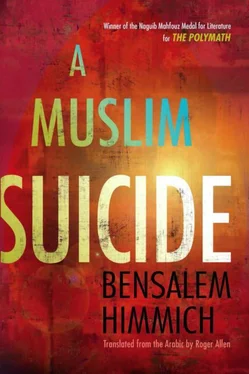Ibn Tumart (c. 1080–1130): An Amazigh scholar who became the founder of the Almohad dynasty (q.v.).
Ibn `Umar (614–693): As his name implies, `Umarwas the son of the second caliph, `Umar ibn al-Khattab, and a famous collector of hadith.
Ibn `Umayra (1186–1259): A Spanish poet remembered in particular for his poetry of nostalgia for the Spain that had been lost to the Christians.
Ibn Zuhr (1113–1198): Member of an illustrious family of physicians, Abu Bakr ibn Zuhr became well known as a poet, serving as physician to the Almohad court of Ya`qub al-Mansur in Marrakesh.
Idris al-Shafi'i (767–820): The founder of the one of the four major schools of Islamic law, his Risala (Epistle) is a major source for the prioritization of authority in determining matters of Islamic jurisprudence, involving the Qur'an and prophetic hadith as sources, and analogy and consensus as methods.
Al-Idrisi: see Al-Sharif al-Idrisi.
Imru al-Qays: The semi-legendary pre-Islamic poet and composer of one of the seven (or ten) renowned long poems known as the Mu`allagat.
Al-'Iqab: see Battle of al-'Iqab.
Jabal Musa ibn Nusayr: The mountain adjoining Sabta that is named for Musa ibn Nusayr, the governor of Africa who dispatched Tariq ibn Ziyad across the straits in 711 CE.
Jihad: A concept within Islamic doctrine that implies "[spiritual] effort, initiative." The usual English translation of the term ("holy war") is in fact a concept of Christian origins and is not a valid translation of the term.
Khadija (c. 555–619): The Meccan woman who became the Prophet Muhammad's first wife. During her lifetime he married no other woman.
Khalij Canal: A canal that used to run through central Cairo, but is now covered over (Port Said Street).
Al-Khalil ibn Ahmad of Basra (c. 718–791): One of the early polymaths in Islamic history, the author of works on music and prosody and the compiler of one of the first dictionaries of Arabic, Kitab al-Ayn. His metrical system was to become the standard for the analysis (and indeed the definition) of poetry.
Al-Khidr: A mysterious figure who appears most prominently in the Qur'an, Sura of the Cave (Al-Kahf, Sura 18), where he places Moses into a series of complex situations. Al-Khidr is also a major reference point in Sufi literature.
Al-Ma`arri (973-1057): One of Arabic's most famous poets. Blind from the age of four, Abu al-`Ala' al-Ma`arri became renowned both for his philosophical poetry and his often heterodox and antiestablishment religious opinions.
Maghrib: Literally "the place where the sun sets, the West," the term "Maghrib" was originally applied to the lands to the west of Egypt as they were converted to Islam in the seventh to eighth centuries. In more recent times, the word refers to the region and nations of Northwest Africa-Tunisia, Algeria, and Morocco-and, more specifically, to Morocco.
Maimonides: see `Abdallah Musa ibn Ishaq ibn Maymun.
Malik ibn Anas (711–795): A foundational figure in the study of Islamic jurisprudence and founder of one of the four major "schools" of Islamic law. His most famous work is A1-Muwatta, a major collection of prophetic hadith. The adherents to his school of law are known as Malikis.
Malik ibn Dinar (d. c. 748): A disciple of the renowned theologian Hasan of Basra (642c. 728), regarded as a reliable transmitter of traditions.
Mamluk: Literally "owned, slave" the name of a dynasty that ruled Egypt and its environs from Cairo during the thirteenth to sixteenth centuries. It was a requirement of the dynasty that the ruler had to have been born a slave.
Al-Ma'mun (1186–1232): Abu al-'Ula Idris, the Almohad ruler, who was born in Malaga in 1186 and lived much of his life in Spain, where he was forced to negotiate with the Christians in order to obtain their support against the rival Banu Hud (q.v.).
Maqama: The name of an indigenous form of short narrative composed in the highly ornate style known as saj' (rhyming and cadenced prose) that came to prominence in the tenth century (with Badi` al-Zaman al-Hamadhani [d. 1008] often described as its initiator).
Marinid: An Amazigh dynasty that took over control of the Maghrib from the Almohads in the thirteenth century and ruled the region till the fifteenth century.
Misriyya: In Morocco, the Misriyya is the name given to a single room on the upper stories or roof of a house.
Mountains of Mecca: The holy city of Mecca is surrounded by mountains. Among the principal ones mentioned in this text are Abu Qubays, running north to northwest; Thawr (Thour) to the south of the city; and Al-Nur to the east, where the cave of Hira', the site of Muhammad's earliest revelations, is to be found.
Al-Mubashshir ibn Fatik (d. c. 1087): A Syro-Egyptian scholar who compiled a collection of ethically based maxims under the title Mukhtar al-hikam wa-mahasin al-kalim.
Muhammad ibn Sharaf (d. 1068): A poet from the Tunisian city of Qayrawan who moved to Spain.
Al-Muhasibi, al-Harith (781–857): Prominent Sufi teacher and philosopher in Baghdad. His Kitab al-tawahhum (Book of Imaginings [of the last days]) is one of his bestknown works.
Al-Mu'izz (930–975): A Fatimid caliph who gives his name to the quarter of Cairo around the Azhar Mosque that was constructed in the tenth century when Fatimid authority was transferred to the city.
Muslim ibn al-Hajjaj (c. 821–875): The compiler of one of the two major collections of sahih, those reports of the Prophet Muhammad's statements and actions that were considered to be maximally authentic and applicable.
Muhammad al-Mustansir ibn Abi Zakariyya (Hafsid ruler, d. 1277): The second ruler in the Hafsid dynasty in Africa (Tunis), who was closely involved in the conflict against the Crusaders and who provided (as the account in this novel suggests) an alternative power center to that of Baybars, the Mamluk ruler of Egypt.
Al-Mu'tamid ibn `Abbad (1040–1095): Renowned Hispano-Arab poet and ruler of Seville who, having at first supported the Almoravids (q.v.) in their fight against the Christians, was deposed by them and ended his life at the Almoravid stronghold of Aghmat in Morocco.
Al-Mutanabbi (915–965): Literally "he who claims to be a prophet," Arabic's most famous poet of the premodern era. He is as well known for his ringing odes in praise of Muslim rulers as he is for lampoons deriding those who failed to acknowledge and reward his talents.
Mu'tazilites: Literally "those who went into seclusion," the term used to describe the group of rationalists who questioned orthodox principles such as the uncreated nature of the Qur'an and predestined evil. The doctrines were adopted by the Abbasid caliph, Al-Ma'mun (786–833), and tested on the theologians of the time through the "examination" process known as the mihna, but were later rescinded during the caliphate of Al-Mutawakkil in 848.
Muwashshah: A type of strophic poetry that emerged in Spain during the Islamic period and spread eastward.
Al-Muwatta [75]: The famous manual of jurisprudence written by Malik ibn Anas (c. 711–795), who gives his name to one of the four major schools of Islamic law.
Al-Muzaffar Sayf al-Din Qutuz (d. 1260): A Mamluk ruler in Egypt who was heavily involved in the fight against the Mongol invaders, but who was assassinated by his rival, Baybars, following the Battle of `Ayn Jalut (q.v.).
Nasrids of Granada: The Banu Nasr came to power in Granada following the disastrous Battle of Al-'Iqab in 1212 (q.v.). Building up Granada as a major cultural and commercial center, they remained in power until the Christian armies of Castile and Aragon captured the city in 1492.
Al-Niffari, Muhammad (d. 965): A famous figure in Sufi writing and thought, the author of the Kitab al-Mawaqif (Book of Stations) and Kitab al-Mukhatabat (Book of Conversations).
Читать дальше












